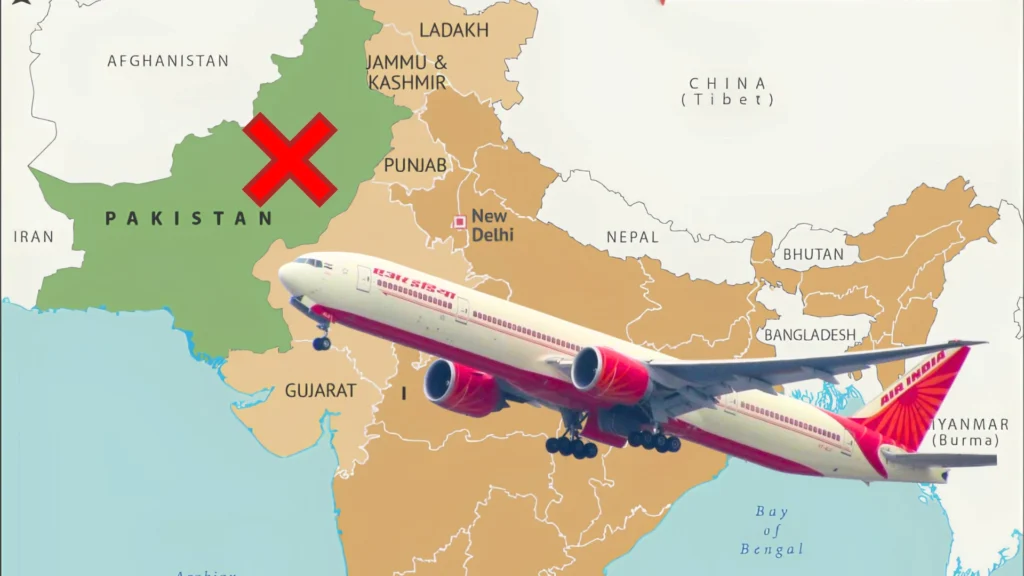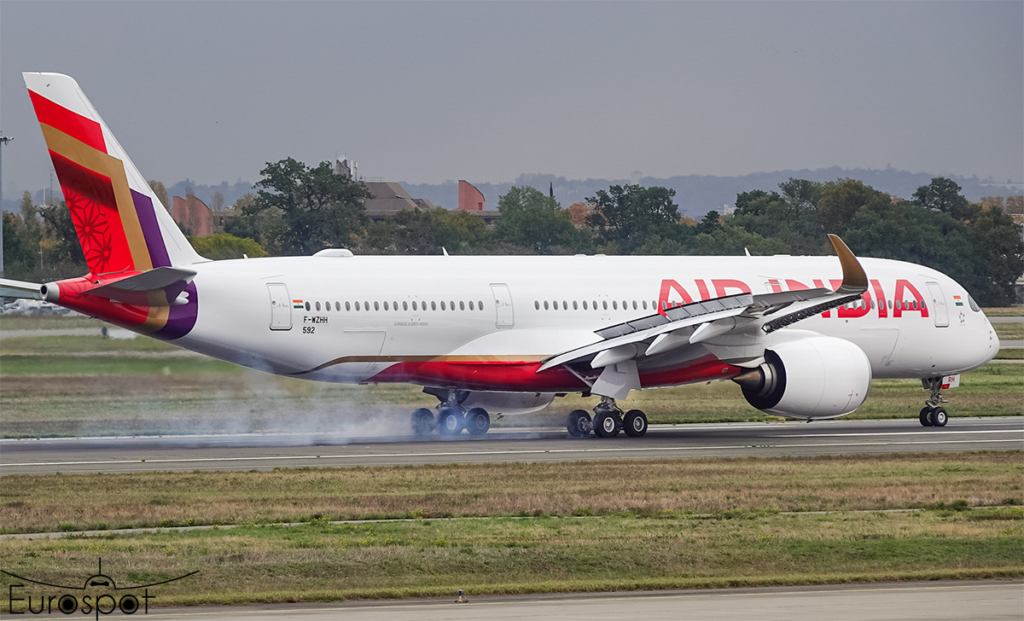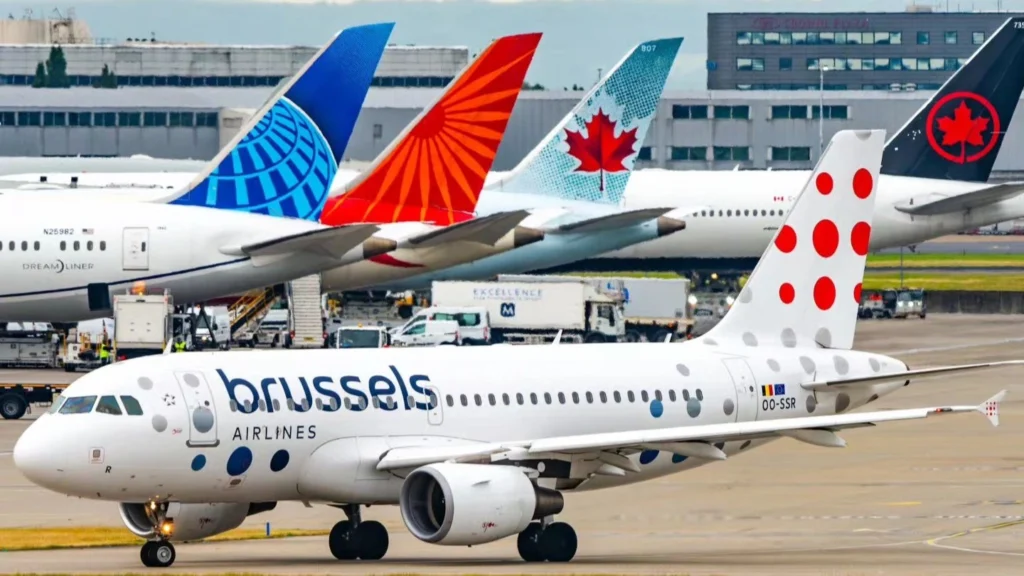
DELHI- Tata Group-owned Air India (AI) is exploring alternative routing options for its North America flights from the national capital to mitigate increased operational costs following Pakistan’s airspace closure.
The Tata Group-owned carrier currently operates 71 weekly flights to North American destinations, with 54 services originating from New Delhi (DEL).
Air India serves Chicago (ORD), New York (JFK), Washington (IAD), San Francisco (SFO), and Newark (EWR) in the United States, along with Toronto (YYZ) and Vancouver (YVR) in Canada.
The airline is considering domestic technical stops to reduce expenses that have escalated due to longer flight paths.
 Photo: Compounded by Aviation A2Z, Credits to Wikimedia Commons
Photo: Compounded by Aviation A2Z, Credits to Wikimedia CommonsAir India Explores New Routes
Air India’s management is actively pursuing solutions to maintain service efficiency despite the challenging circumstances.
According to Air India MD and CEO Campbell Wilson, the airline has already implemented temporary adjustments to its Europe and US routes in response to recent airspace restrictions, including adding technical stops at European airports.
The carrier is evaluating domestic technical stops, potentially at Mumbai (BOM) or Ahmedabad (AMD), which could eliminate the need for European layovers currently occurring in Vienna (VIE) or Copenhagen (CPH). This domestic stopover strategy aims to address multiple operational challenges:
- Reduced fuel consumption compared to the current longer routing
- Lower operational expenses by avoiding high European airport fees
- Better management of Flying Duty Time Limitation (FDTL) for crew members
- Improved aircraft utilization despite extended flight times
Additionally, DGCA regulations limit flight crews to eight hours of continuous duty, which becomes problematic with extended flight times.
When flights include an en route landing, airlines can request permission for extended crew duty hours. Long-haul and ultra-long-haul flights exceeding 14 hours typically operate with two complete crews.
 Photo: Eurospot
Photo: EurospotImpact on Operations
The financial implications of Pakistan’s airspace ban are substantial for Air India. The airline has estimated additional expenses of approximately USD 600 million annually if the restrictions remain in place. This calculation factors in increased fuel burn, extra landing charges, and other operational adjustments required to maintain service.
Industry analysis suggests that Indian carriers collectively face additional monthly operational costs exceeding Rs 306 crore due to the Pakistan airspace closure. These expenses primarily stem from extended flight durations and technical stops that were previously unnecessary.
According to a senior airline industry official with extensive commercial experience, a standard 16-hour North American flight now requires approximately 1.5 additional hours of flying time. This extension costs approximately ₹29 lakh per flight, including landing and parking charges for technical stops at intermediate airports.
 Ram Mohan Naidu taking MoCA charge; Photo- ANI
Ram Mohan Naidu taking MoCA charge; Photo- ANIGovernment Assessment
The Civil Aviation Ministry, led by Minister K Rammohan Naidu, is actively assessing the situation’s impact on both airlines and passengers.
On April 28, the Minister confirmed that the ministry is working with airlines to develop solutions and evaluate potential airfare increases resulting from higher operational costs.
Air India, along with other Indian carriers like IndiGo (6E), has submitted detailed impact assessments to the ministry. The airline has suggested that some form of financial assistance may be necessary to manage the extraordinary situation effectively while maintaining service standards.
The airspace restrictions began on April 24 when Pakistan barred Indian airlines from using its airspace following India’s retaliatory measures in response to the Pahalgam terror attack. On April 30, India reciprocated by prohibiting Pakistani airlines from utilizing Indian airspace.
 Photo: Siddh Dhuri | MumbaiPlanes
Photo: Siddh Dhuri | MumbaiPlanesInternational Carriers Avoid Pakistani Airspace
Major western airlines have voluntarily begun avoiding Pakistani airspace despite facing no official ban, adding to the growing financial impact on Pakistan’s aviation sector.
Over the past two days, American Airlines, Lufthansa, British Airways, Swiss, Air France, ITA Airways, and LOT have implemented route changes due to escalating tensions between India and Pakistan.
This voluntary rerouting follows Pakistan’s formal ban on Indian carriers using its airspace, implemented on April 24 following the Pahalgam terror attack. The expanding scope of carriers avoiding Pakistan’s airspace now affects both east-west and west-east air traffic routes.
Flights between Europe and India now require approximately one hour of additional flying time due to these diversions. This extension translates directly into increased fuel consumption, higher operational costs, and potential schedule disruptions for airlines operating these routes.
Airlines may eventually transfer these additional costs to passengers through fare increases, though the timing and implementation of such price adjustments remain uncertain. The competitive nature of international routes may delay immediate price increases as carriers absorb short-term costs.
Pakistan’s Civil Aviation Authority faces significant financial consequences from this situation. The authority stands to lose hundreds of millions of dollars annually in overflight charges, representing a substantial revenue stream for the country’s aviation infrastructure. These fees are normally collected from all international carriers traversing Pakistani airspace.
Stay tuned with us. Further, follow us on social media for the latest updates.
Join us on Telegram Group for the Latest Aviation Updates. Subsequently, follow us on Google News
Air India Seeks Rs.5,000 Cr Subsidy Amid Pakistan Airspace Ban
The post Air India Finding New Routes for US and Canada Flights Amid Pakistan Airspace Ban appeared first on Aviation A2Z.
